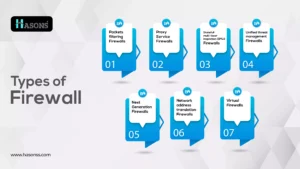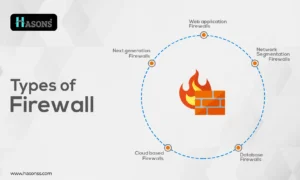What is Firewall?
Besides these, do you know what guards your digital life against evil in the world of technology? If you’re looking for this, you’ve come to the right place, welcome to the world of firewalls – a hidden gem of cybersecurity. However, in this blog post, we are going to focus on delving deeper into the different types of firewalls, finding out which architecture is the ultimate king, explaining the benefits of these tools, and, finally, blowing the lid off what are, in essence, protectors of everyone’s online experience. Let’s make sure the seats are comfortable, the popcorn is popped, and dive straight into the exciting world of firewalls!
Types of Firewalls
Packet-Filtering Firewalls
Packet-Filtering Firewalls can be described as the most fundamental type of firewall and Characteristics of Firewall that exercises the filtering of traffic through laid down rules. He uses parameters such as IP addresses, ports, or protocols to scrutinize packets and decide whether to allow or drop them. These firewalls are beneficial when it comes to securing a network as much as they are a good start.
Stateful Inspection Firewalls
Stateful Inspection Firewalls are aware of the status of continuing transactions. They operate in the context of traffic, strengthening security through deep securitization of the data packets, beyond the capabilities of packet-filtering firewalls. It is also useful in detecting and preventing dangers more efficiently than other current technologies.
Proxy Firewalls
Proxy Firewalls are third party that closes the connection between the user and WWW and only let through known good traffic. This is in addition to filtering network packets at the application layer and act as an extra security measure for organizations by hiding internal IPs from outsiders.
Next-Generation Firewalls (NGFWs)
Next-Generation Firewalls (NGFWs) for cybersecurity are the improved or enhanced system of the firewall. There are other additional options such as intrusion prevention, application awareness as well as deep packet inspection to counter complex threat attacks. NGFWs are ideal in offering an all-round protection solution to current complex networks.
Unified Threat Management (UTM) Firewalls
Unified Threat Management (UTM) Firewalls incorporate several security features into a single solution. This kind of firewall has a multi-layered security feature where it incorporates elements of intrusion detection, antivirus, and content filtering.
Network Address Translation Firewalls
NAT Firewalls serve to translate the private IP addresses into the public ones thus creating an extra barrier. Traditional firewalls are used in home and small office networks to block connections with the outside world.
Cloud Firewalls
This security technology defends cloud resources and related information by preventing unauthorized access. It works in the cloud environment and protect virtual machines, applications, and Networks. As service policies and rules, cloud firewalls play an important role in offering security and reliability of Cloud computing environment.
Network Address Translation (NAT) Firewalls
NAT firewalls manage and modify IP address information in packet headers to maintain privacy and allow multiple devices on a local network to share a single public IP address. They provide a layer of security by hiding internal IP addresses from external networks, making it harder for attackers to target individual devices within the network.
Application-Level Gateways (ALG)
ALGs specialize in controlling traffic at the application layer, allowing or blocking specific protocols like FTP or SIP. They inspect and modify packets based on the applications they are associated with, providing fine-grained control over network traffic. This ensures enhanced security and compatibility with certain protocols.
Web Application Firewalls (WAFs)
Web Application Firewalls (WAFs) operate as a protective layer, preventing web applications from numerous threats on the internet such as, SQL injection, cross site scripting and other related scourges. They analyze the HTTP traffic between a web application and the Internet to allow or deny entry to content that is potentially hazardous to the server.
Hardware Firewalls
Hardware firewalls are standalone equipment that are used in networks to offer an independent layer of protection. They provide very good security as they allow or disallow traffic based on a pre-determined security standards. Large institutions typically use these firewalls due to their high performance and reliability.
Software Firewalls
Software firewalls are known to be applications that are installed on individual computers to filter or block traffic in a network. They provide privacy and can be fine-tuned to meet the user’s specific security needs.

What is the best form of Firewall Architecture?
Determining the appropriate firewall architecture depends on the specific network in question; there is no one-size-fits-all solution. Both have their uses and drawbacks; when choosing between them, it is essential to consider factors such as security requirements, complexity, expansibility, and compatibility with current systems.
Advantages of Firewall
1. Enhanced security through traffic control.
2. Protection against unauthorized intrusions.
3. Identification of risk elements.
4. Safeguarding confidential information.
5. Versatile solutions for various network needs.
6. Effective defense against cyber threats.
7. Granular control over network traffic.
8. Prevention of data leakage.
9. Real-time monitoring and logging.
10. Cost-effective security solution.
Conclusion
While selecting the firewalls, you should choose the firewalls that will suit its network and the amount of security it needs. Given the variety of firewalls in the market, each designed with different features and functionalities, researching well is important.
| If you are reading Types of Firewalls then also check our other blogs | |
| Computer Virus | First Electronic Computer |
| COPA Full Form | Pros of technology |
Types of Firewalls

